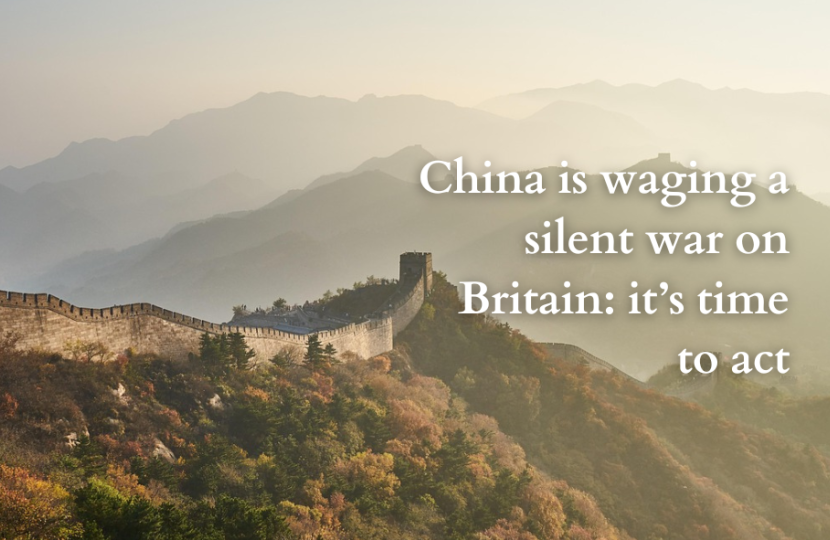
History is replete with lessons of the folly of capitulation in the face of aggression. Appeasement does not buy peace
When the heads of both the FBI and MI5 stand shoulder to shoulder to declare that “China is the biggest long-term threat to our economic and national security,” it is impossible not to take notice. In an unprecedented alignment between two of the most significant intelligence agencies in the Western world, their words ring like a warning bell echoing through history.
We are no longer in an era of ideological posturing or Cold War rhetoric; the Chinese Communist Party (CCP) is waging a silent war on the West. It is attacking the very foundations of our societies – interfering in elections, violating human rights, launching cyberattacks on critical infrastructure, and using brute force against dissidents who seek refuge within our borders.
The scale of this threat is staggering. Our own security services have responded by more than doubling their operations against hostile Chinese activity, with the number of investigations into CCP interference now seven times higher than in 2018. These numbers should be a wake-up call for any government that values sovereignty, security, and the sanctity of its democracy.
It was in this climate of rising hostility that, as Home Secretary, I made the decision to exclude Yang Tengbo from the UK. This was not a routine immigration case but a matter of national security. The Special Immigration Appeals Commission has now publicly upheld that decision, with Mr. Justice Bourne confirming that Mr. Tengbo posed a serious threat. Tengbo was linked to the CCP’s United Front Work Department (UFWD), an organisation described by President Xi Jinping as a “magic weapon.” Its purpose? To manipulate and co-opt elites in foreign countries, shaping their decisions in favour of Beijing’s interests.
For many in Britain, the UFWD remains an obscure entity, its activities shrouded in secrecy. But its methods and intentions are anything but benign. The UFWD is at the heart of the CCP’s strategy to achieve “elite capture” – recruiting former politicians, business leaders, and public figures to serve Beijing’s interests. These individuals, often handsomely rewarded with think-tank positions or lucrative university posts, find themselves drawn into a web of influence where their independence is steadily eroded.
This is not soft power as we understand it in the West. It is clandestine, coercive, and corruptive – a triad of influence designed to silence criticism and amplify pro-CCP voices. As MI5 has warned, the UFWD engages in campaigns that are patient, well-resourced, and highly deceptive. The goal is simple: to ensure that Beijing’s critics are drowned out, and its influence takes root in the highest echelons of Western decision-making.
The damage this does to Britain is incalculable. When policymakers, business leaders, and academics are co-opted into this system, our national interests are subordinated to Beijing’s ambitions. The stakes are nothing less than our ability to act independently and to safeguard our own future.
Despite the mounting evidence, this government seems wilfully blind to the scale of the threat. The National Security Act I delivered last year included a vital Foreign Influence Registration Scheme, a measure designed to bring transparency to foreign interference in British politics. Yet, months into its term, this government has failed to implement it.
Instead of treating China as the existential threat it is, ministers have spent their time tiptoeing around Beijing. David Lammy’s visit to China earlier this year was a case study in appeasement, marked by a conspicuous silence on human rights abuses. Meanwhile, the government found time to undermine Britain’s strategic position in the Indian Ocean by surrendering sovereignty over Diego Garcia. This military base is critical to countering China’s growing naval presence in the region. Its loss undermines not only Britain’s defence posture but also the broader balance of power in the Indo-Pacific, where China’s ambitions grow unchecked.
Appeasement does not buy peace. It never has. History is replete with lessons of the folly of capitulation in the face of aggression. Each concession emboldens those who seek to challenge us, encouraging ever more audacious attempts to undermine our sovereignty and security.
If Britain is to regain its place as a serious global power, it must abandon its current policy of weakness and rediscover its resolve. This means treating China for what it is: the greatest long-term threat to our way of life. It requires decisive action, not only to counter the CCP’s malign activities but also to protect the values and freedoms that define us.
This is not merely a question of national security; it is a question of national survival. Britain must stand firm, uphold its sovereignty, and lead by example in resisting Beijing’s attempts to reshape the world in its image. The time for action is now.

